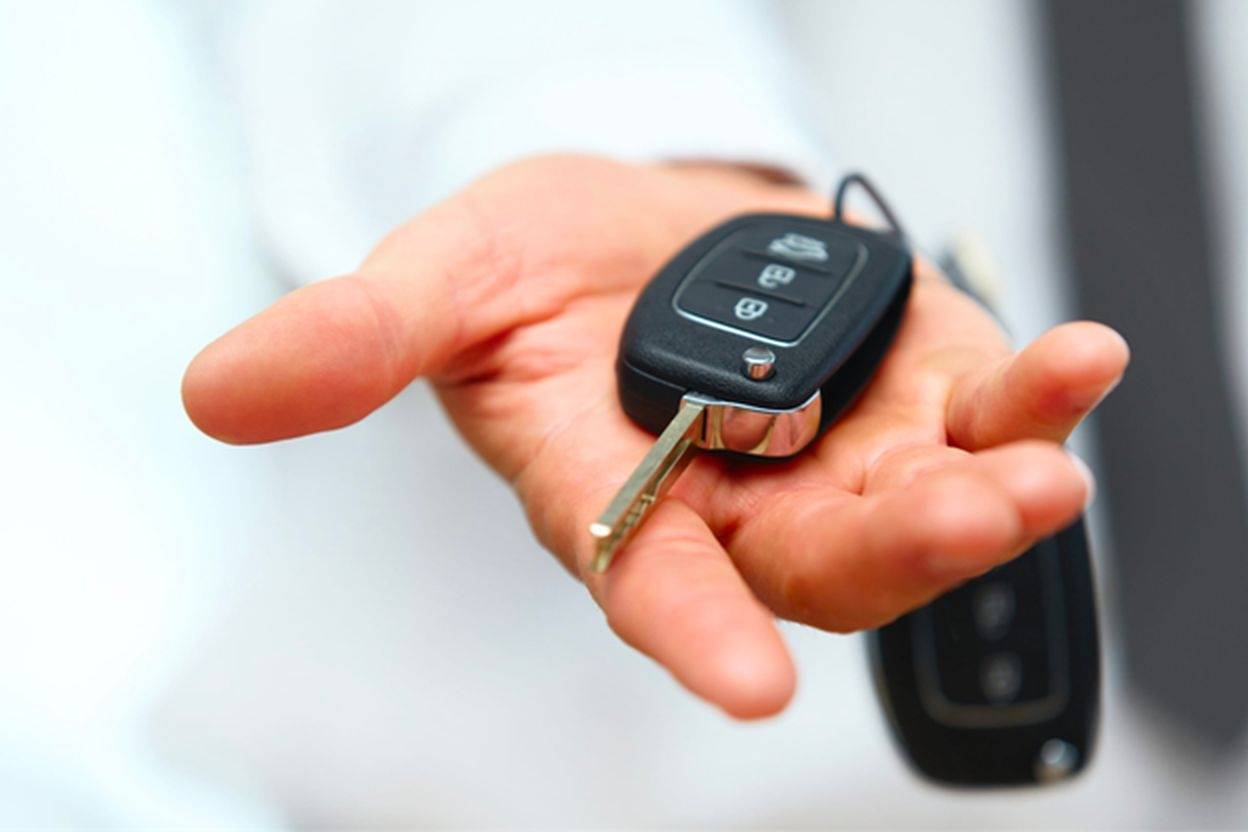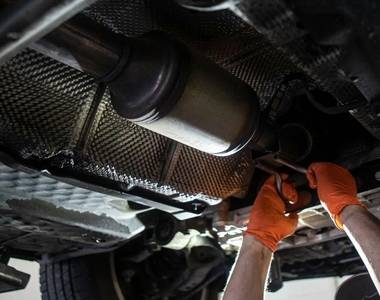If a close friend or loved one has passed away, you might find yourself responsible for their assets, including their car title and ownership. Since the car isn't yours, you'll have to go through a few extra hoops. But the process is quite simple.

Selling a deceased person’s car requires a few extra steps and careful planning. This comprehensive guide shows you exactly how to do it the right way.
Selling a Deceased Person's Car: Explained

The death of someone close to you is a distressing time. Deciding what to do with their possessions can add to the sadness. In the case of selling a car, it can also be difficult logistically.
But 77% of all UK households have at least one car, making this one of the more common situations. Some choose to keep the car for themselves. Others choose to give it to a family or friend. If it's just taking up space, selling it could be the best option.
If you find yourself having to sell a deceased person's car, this article will make the process easier.
Overview: Can I sell a deceased person’s car?
The answer is yes. If you are an executor of the deceased person's estate, you can sell their car after their passing.
You'll need to provide proof that you have the legal right to do so (you may need a grant of probate). You will also need the vehicle registration document (V5C logbook) and the vehicle owner's Death Certificate.
The Step-by-Step Process
There are additional hoops to jump through when selling a deceased person's car. To do it successfully, you need to follow these steps carefully.
1. Immediate concerns when a loved one passes away
Before getting started, there are a few critical considerations.
- If you have to drive the car immediately after the person's passing, you'll need to make sure it is legally insured. Before getting in the vehicle, contact the insurance company to verify you will be covered (even if you were named on the policy). Most insurance policies will automatically terminate when the policyholder dies, so you have to double-check.
- Even if you don't have a need to drive the car, insurance is a huge importance. In the event of fire or theft, the vehicle won't be covered without it. Verifying its insurance cover (or setting up a new policy) gives you peace of mind when you sell your car.
- Your exact relationship to the deceased person will also determine the exact paperwork you need. If you are their spouse, for instance, you have different legal status from a friend or non-immediate relative. Speak with a solicitor to clear up any confusion around the legal aspects.
- The steps in this guide assume you are the executor of their estate or are otherwise legally entitled to sell the car. It does not constitute legal advice. If you aren't sure if this applies to you, seek legal counsel before doing anything.
2. Confirm legal authority
The most important document you'll need to sell a deceased person's car is the grant of probate. This proves that you are the official executor of their estate according to their will or other legal documents.
If you can't find this document, request a copy from the Probate Registry. Until you have it, don't do anything else.
If the deceased person has no executor or will, you can apply for probate via the government's website.
3. Notify the DVLA of the person’s death
Your first step after clearing everything up with the insurance provider and confirming legal authority is to notify the DVLA. This step applies to everyone dealing with the passing of a loved one who owned a car (and/or had a driving licence).
You can tell the DVLA directly or use the UK government's Tell Us Once service, which will also inform the Passport Office, councils, HMRC, and the Department for Work & Pensions. The DVLA will then remove the deceased person from the registration and cancel any outstanding taxes or fees associated with it, including road tax.
Tell Us Once is available in most areas of the UK. If you can't use it or don't want to use online services, you can write to the DVLA and include the following:
- The name and address of the deceased person
- Their date of birth
- The date they passed away
- The vehicle registration number (VIN)
- Their driving licence number, if possible
- Your relationship to them
- Do not include their Death Certificate
Note: After you notify the DVLA of your loved one's passing, the car won't be taxed any longer. If you or someone else plans to drive it, you'll need to tax it again or declare it off the road using a Statutory Off Road Notification (SORN). Don't wait to hear back from the DVLA — do either of these two steps immediately.
4. Check for unpaid loans on the car
You can't sell a car on finance. So if the deceased person took out a car loan and still had payments outstanding, you can't sell the car until it has been paid off.
If this is the case, contact the finance provider (the bank, credit union or other lending institution). You'll need to present proof of death and details of your relationship to them.
According to UK law, debts left behind post-mortem are paid out from their estate. Many car loan agreements include a death clause, which cover the repayment process. Usually this clause states the debt will be repaid from their estate unless there is a co-signer (who would be liable in that case).
5. Gather the necessary documents
There are several documents needed to sell a car. They include:
- V5C logbook — the most important document when selling your car. This is the car's registration document, and it should be in the deceased person's name. You can sell a car without a V5C, but it will take additional steps (and you cannot replace a lost logbook for a deceased person).
- Death Certificate — you'll need the deceased person's death certificate to prove their identity. Private buyers may not ask for it, but dealers won't accept a car from a deceased person without it.
- Grant of probate (or other legally binding paperwork) — you need a document that names you as having permission to sell the car on behalf of the deceased.
- MOT certificate — a requirement for selling a roadworthy vehicle. You can sell a car without an MOT, but you will have to accept much less money for it.
- Service history — whether you're selling a van, car or truck, you can easily pull its service history online using the VIN. This isn't a requirement for selling your car, but it can help you get the best price if there are service records to show potential buyers.
- Photo ID — you need this to prove your identity when selling the car. Accepted forms of ID include a passport, drivers licence or military ID card.
6. Determine ownership and liens
If someone other than the deceased person owned the vehicle, you must obtain written permission from them to transfer it into your name. This is a possibility if the deceased person is the registered keeper, but not the owner.
You must also check to make sure there are no outstanding payments or liens on the car. If so, these must be cleared before you can transfer ownership to yourself.
7. Appraise the car's value
Once you have all the paperwork in order, you're ready to carry out the typical selling process. This starts with understanding the car's value.
Depending on the condition, you start the process online fairly easily.
- If the car you're selling is stock, you can use our car value calculator to get a roundabout estimate.
- If you're selling a damaged car, you can do the same. Just expect less money depending on the damage.
- If you're selling a modified car, you'll have to do more research into the true value of the parts, whether or not they're from the original equipment manufacturer (OEM), safety and their overall condition.
- If the car is a write-off, you probably won't get much for it since there will be a lot of paperwork.
After you have an estimated value, take it to a mechanic for further evaluation. They'll be able to tell you about underlying problems and any other issues that could impact the car's price. They'll also verify the vehicle's condition and give you recommendations for fixes that can help you get the best price.
8. Prepare the car for sale
Preparing the car for sale is one of the most critical parts of the process. You wouldn't want to go through all that work just to get a bad price because it's dirty, would you?
Take the following steps to get your car ready for sale:
- Clean it inside and out
- Repair any minor dents, scratches, or other damage
- Change the oil and filter
- Check the brakes and lights
- Have a mechanic inspect the engine, transmission, suspension system, and other components
- Detail it — this is an optional step but it'll be the best £200 you've ever spent (trust us)
9. Decide on the selling method
How you choose to sell your car will depend on:
- The condition it's in
- How much work you're willing to put in to get the best price
- Your desired timeline
You have a few options when it comes to selling your car:
- Selling at an auction
- Selling privately (online or in person)
- Trading the car with a dealer
- Selling it outright to a dealer
- Donating the car to charity
Selling to a dealer
Selling your car to a dealer is the best way to get rid of it fast. Reputable businesses usually give you a decent price. The only caveats are the vehicle has to be in-demand, in good condition, and have a valid MOT certificate/V5C logbook.
When selling to a dealer, they will ask you for additional information, such as:
- A letter/email from the solicitor confirming you are the executor/administrator of the deceased’s estate
- Death Certificate copy
- Photo ID of the next of kin
- Legal documents stipulating where the payment should be made
Selling online
Selling your car online is a fantastic option if you want convenience. Online car buying sites usually pick the car up for you and pay you quickly. It's a great way to get rid of your car without worrying about the paperwork or meeting with potential buyers. Be aware that online sites can offer less money than you'd expect from private sales or trade-ins.
Like dealerships, car buying services will want to see proof of your legal right to sell the car. Depending on whether the deceased owner's estate is worth less than £10,000 and whether a solicitor manages it are other factors that could affect the sale.
Selling it privately
If you want the best price for your car, we recommend selling it privately. Listing it on online classified sites like AutoTrader is your best bet. Many of them are free, and you'll get immediate exposure to hundreds of potential buyers. You'll need to take care of the paperwork (and be wary of car selling scams), but you also get to set your own price and negotiate if necessary.
Other options
If you're selling a salvage car, consider donating it to charity, selling it to a scrap yard or parting it out. It's the best way to make sure you get something out of it, even if you can't find someone to buy the whole thing. The same applies if you're selling a non-running car.
10. Handle enquiries and offers
If you choose to sell the car on your own, you'll be responsible for responding to enquiries and offers.
- Respond to emails, texts or phone calls quickly. Make sure you have a system in place so nothing falls through the cracks.
- Have lots of pictures ready. The more, the better when it comes to selling a car.
- Set up a test drive with any potential buyers and make sure you're present for it.
- Don't be pressured into accepting an offer right away; take your time to assess each one and consider all factors before making a decision.
- Don't give too many details about the car over the phone or email. Keep all conversations for when you meet in person.
11. Complete the sales transaction
Whether you sell the car to another business or a private buyer determines how this step plays out.
- Selling to another business: They'll handle the paperwork, often in the form of a Bill of Sale. Usually, you'll get paid on the spot and they'll take the keys right out of your hands after doing some paperwork.
- Selling to a private buyer: This is where you'll need to do most of the work. You must handle all paperwork required to transfer ownership, including completing the V5C logbook. Create your own Bill of Sale detailing the terms of the transaction. Both you and the buyer must sign it and keep a copy for your records. Don't do anything else until the money lands in your account and clears.
12. Transfer ownership
When selling a deceased person's car, you need to write to the DVLA's sensitive casework team of the sale. You will also detail your relationship with this person, their date of death and who the DVLA should refund road tax to.
- Selling to a trader: Ask them to complete the section of the V5C titled "sell, transfer, or part-exchange your vehicle to the motor trade". Tear out this section and include it with your letter. The buyer retains the rest of the V5C.
- Selling to a private buyer: You must complete the V5C logbook, and hand the green slip (V5C/2) over to the new owner. They need this to tax and insure the vehicle. You will then notify the DVLA.
13. Cancel existing insurance
After the transaction is complete, you can cancel the insurance on your vehicle. You don't want to do this too early in the process because you still need to be able to drive the car if you're selling it directly to the buyer. You also want protection in the event of theft or damage.
14. Handle proceeds from the sale
How exactly you handle the proceeds of the sale will depend on whether you are an executor, administrator or next of kin. Typically, you'll need to pay off any debts that the deceased had and then distribute what's left to beneficiaries in line with their will.
If there is no will, you should divide the money amongst those entitled under intestacy laws. Speak to a solicitor for advice on what to do in this situation.
The importance of estate planning
As you can tell, this process is straightforward but incredibly painstaking. It's considerably easier if the deceased person has a will with instructions for handling their possessions.
Without the right paperwork, you'll have to apply for a grant of probate or Letters of Administration to prove you're the rightful heir and handle all transactions in line with intestacy laws.
Estate planning is crucial for making sure your assets are handled correctly, especially if you plan on owning a vehicle. Get professional advice from a solicitor or financial advisor about creating a legally binding will that reflects your wishes.
Wrapping up
Selling a deceased person's car is complex but achievable with the right information and guidance. The first step is to verify your legal authority and get your documents in order. You then need to decide which route is best for the sale: a dealership, car buying service or private buyer.
Through all this, keep in mind that estate planning and executor arrangements can make a huge difference. Even if you don't own a car yourself, it's important to consider creating a legally binding will so your wishes are respected when you pass away.
Want to learn more? These are the questions our sellers ask us the most.
Can I sell a deceased car before probate?
In almost all cases, you cannot sell a deceased person's car until you have obtained probate. There are only a few exceptions, such as if the car was jointly owned or insured and the other owner wants to take over its ownership.
What happens if there is no will or executor for the deceased person's estate?
If there is no will or executor for the deceased's estate, you'll need to apply for Letters of Administration. This gives someone (usually a relative) lawful authority to deal with financial assets and possessions left behind by the deceased person.
Are there any specific tax implications when selling a deceased person's car?
In general, there are no specific tax implications when selling a deceased person's car. Any proceeds from the sale will be handled per their will or intestacy laws and divided amongst eligible heirs.
What happens if the deceased person's car is jointly owned?
If the deceased person's car is jointly owned with another person, you'll need to decide how to handle the sale. The other owner may wish to take over ownership of the car or you can both agree to sell it and split any proceeds from the sale.
Are there any legal restrictions on selling a deceased person's car?
The only legal restriction on selling a deceased person's car is you must have legal authority to do so. This could be a grant of probate or Letters of Administration. You will need these documents to apply for a new logbook and transfer the car's ownership.
Can a car be sold if the deceased person had a living trust?
A living trust is specifically designed to bypass probate and handle assets on behalf of a deceased person's estate. If the car is an asset owned by the living trust, the trustee (or trustees) should be able to handle the sale and transfer of ownership without probate.
How long does selling a deceased person's car usually take?
The amount of time varies wildly depending on whether you're selling to a dealer, car buying service or private buyer. In any case, it will take considerably longer considering the extra steps, especially if your loved one did not have a will.










